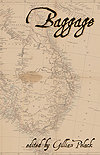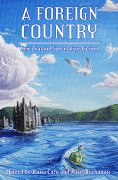What I’m Reading: “Baggage”
 I haven’t been doing a great deal of reading lately as my life has been caught up between giving my best efforts to making The Gathering of the Lost (The Wall of Night, Book Two) a “gotta stick with it–things are a happenin’ fast–don’t stop reading–don’t ansa the phone–don’t move–don’t skip a beat”* read for you all ‘out thar’, and dealing with all the usual round of earthquake aftermath: you know, insurance claims, calling tradespersons (mostly men, but every now and then … so let’s be gender neutral here), persuading said tradespersons to come at all (needless to say they are currently much in demand) and answering their queries and assisting as required when they do finally arrive. Not a great deal of time for sitting in the sun reading a book during all of that.
I haven’t been doing a great deal of reading lately as my life has been caught up between giving my best efforts to making The Gathering of the Lost (The Wall of Night, Book Two) a “gotta stick with it–things are a happenin’ fast–don’t stop reading–don’t ansa the phone–don’t move–don’t skip a beat”* read for you all ‘out thar’, and dealing with all the usual round of earthquake aftermath: you know, insurance claims, calling tradespersons (mostly men, but every now and then … so let’s be gender neutral here), persuading said tradespersons to come at all (needless to say they are currently much in demand) and answering their queries and assisting as required when they do finally arrive. Not a great deal of time for sitting in the sun reading a book during all of that.
But there’s still the sandwich-at-lunchtime-at-the-kitchen-bench pause (although of course, some of the said tradespersons do seem to have a knack for turning up just as I’ve got my pinny on and am embarking on my first bite of the sandwich: very sigh inducing) which is particularly conducive to certain kinds of reading. Like short stories. Generally speaking I am not a huge reader of short fiction, novels are more my cup of tea (with the sandwich, preferably, and maybe a choccy biccy or two thrown in), but they are very good for short byte reading—and even better when you find a good collection or anthology.
And a good one is what I’ve been reading over the past few days. The anthology is Baggage, edited by Gillian Polack and published by Eneit Press (Australia.)** The first clue to the anthology lies in the title Baggage and when we turn to the back cover we learn that this refers to cultural baggage as much as anything else, the invisible baggage that we all carry, much of which may be intergenerational. In particular, this is Australian baggage, although there is one story that is set in New Zealand, at Franz Josef glacier on the West Coast.
Overall, I really enjoyed this collection, with some standout stories (for me) being Hive of Glass by Kaaron Warren, Albert & Victoria/Slow Dreams by Lucy Sussex, Macreadie v The Love Machine by Jennifer Fallon, and Welcome, Farewell by Simon Brown—although in fact there were at least another four that I enjoyed almost as much. The anthology also includes an “Afterwords” section at the back where each writer talks about the process of/ideas behind creating their story, which I thought was a nice touch.
 Recently I discussed whether there was a uniquely New Zealand speculative fiction, here, and in particular discussed how the themes of environmental dystopia and to a lesser, but still noticeable, extent reproductive scifi, occurred within the anthology A Foreign Country (Eds. K. Buchanan & A. Caro, Random Static.) Tim Jones, in commenting, wondered whether this focus might not, to a certain extent, have been driven by the title itself, both by the writers when addressing the story and the editors when making their selection. The same is quite possible with the title Baggage, but nonetheless I was intrigued to notice that a strong theme emerged through what were very different stories. Australia as landscape and environment was strongly present in all the stories (except the one about Franz Josef glacier, where environment/landscape was nonetheless a defining factor in the story.) The response of diverse cultures, whether positive or hostile, to that landscape, defined the anthology for me.
Recently I discussed whether there was a uniquely New Zealand speculative fiction, here, and in particular discussed how the themes of environmental dystopia and to a lesser, but still noticeable, extent reproductive scifi, occurred within the anthology A Foreign Country (Eds. K. Buchanan & A. Caro, Random Static.) Tim Jones, in commenting, wondered whether this focus might not, to a certain extent, have been driven by the title itself, both by the writers when addressing the story and the editors when making their selection. The same is quite possible with the title Baggage, but nonetheless I was intrigued to notice that a strong theme emerged through what were very different stories. Australia as landscape and environment was strongly present in all the stories (except the one about Franz Josef glacier, where environment/landscape was nonetheless a defining factor in the story.) The response of diverse cultures, whether positive or hostile, to that landscape, defined the anthology for me.
Intriguingly, the only story that contained even a breath of environmental dystopia was Albert & Victoria/Slow Dreams, the story set in NZ. And it was only a breath, compared to the stories contained in A Foreign Country. (Many of which I also enjoyed very much, by the way, but my preoccupation is whether there are cultural themes that are distinctively Australian/New Zealand that emerge through our speculative fiction.)
So if you like short fiction and enjoy explorations of culture with speculative fiction overtones and a strong sense of “Australia” (without being self-consciously Australian) then I think you will enjoy Baggage. I definitely believe that it will repay a read.
—
* Comment from EJ Kerr on first reading The Heir of Night.
** To read a heartbreaking story about what can happen to small presses like Eneit when big chains like Borders go into statutory management, read this post on Mary Victoria’s blog.








I had exactly the same favourites in ‘Baggage’! snap… 🙂
OK, that’s amazing!
I’m so pleased you enjoyed it :).
I don’t know if it helps your analysis, but this was a by-invitation-only anthology, so all of the writers were responding to quite specific discussions with me. Because they were all experienced writers, we mostly eschewed normal editing and instead went with phone and email and chatroom discussions on what was working and why. Landscape and environment discussions didn’t actually come up that often (with Janeen and with Lucy more than the others, from memory) but it was there from the very first drafts with all stories. Even Monica had landscape, albeit her landscape was paper.
I was thinking how dark the speculative visions of our two countries are. Not unredeemedly bleak, but not the lucky country/mateship/positive image that other media have given us. Baggage isn’t a horror anthology, but three of its stories are in Australia’s year’s best horror, for instance.
Now you’ve got me thinking. I don’t know if this is a good or a bad thing…
Gillian,
I did enjoy Baggage—very much!
And surely, thinking always has to be good, right? Well, I think so anyway.:)
In terms of the darkness/bleakness of ANZAC speculative vision, I can’t help wondering if it isn’t because we have it so good—compared to the greater part of the world—that we have to get our suffering through fiction? (I am being humorous, but only in part.) Another rationale may be dislocation: we are still only very recent arrivals in both a cultural and geographic sense and are still struggling with that transition, even intergenerationally: ie something of Frost’s “the land was ours before we were the lands”?
By the way, your process for the stories’ development sounds really fascinating and is affirmed (not that I am suggesting that affirmation is in any way required) by the quality of the result.
I always thought that the Australian vision had the potential for bleakness because we perceive our environment as tough and that means we get to create ourselves as tough even when we grow up in suburbia. Now I’m realising that this is only one component. The dsilocation you talk about – that’s much bigger. We brought our baggage with us and don’t often address it, as well (which is why I wanted to do the anthology). We can’t belong until we understand who we are and have been, in essence.
Gillian, I’ve bumped my reply to this comment into further post discussion, here.:)